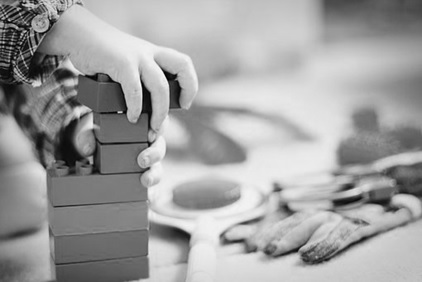 With seemingly endless opportunities (birthdays, holidays, ahem…grandparents) for children to constantly be acquiring more stuff, parents everywhere are probably saying, “enough already!” However, as frustrating as toys can be sometimes, and especially when they are scattered everywhere around the house, they do actually have numerous educational benefits for kids of all ages!
With seemingly endless opportunities (birthdays, holidays, ahem…grandparents) for children to constantly be acquiring more stuff, parents everywhere are probably saying, “enough already!” However, as frustrating as toys can be sometimes, and especially when they are scattered everywhere around the house, they do actually have numerous educational benefits for kids of all ages!
Breaking down the Educational Benefits of Toys by Age
1. Babies
For babies, nearly everything they encounter can seem like a “toy” in the fact that it is interesting and new. And actual designated toys for babies go a long way in teaching them about the world around them. Toys in varying textures, colors, and sizes stimulate babies and help them discover their senses – especially their developing sense of sight. As babies grow, toys – blocks, for example – also help develop gross and fine motor skills.
2. Toddlers
Toddlers, much like babies, experience education readily through their environment. They can get education through some of their old baby toys by using them in a new way (sorting and stacking blocks, for example, which helps motor skill development and also teaches cause and effect). However, they also benefit from toys designed specifically for their age. Toys that are meant to be sorted by shape or color are great for toddlers, as are toys that can be more intricately connected, such as Lego. Your toddler might also be ready for toys that mimic the real world, like play food, tools, or playhouses.
3. Preschoolers
Preschoolers can begin to become very imaginative in their play, so this is where items that mimic everyday life can be very beneficial (kitchen sets, baby doll accessories, toy cars, etc.). Playing with these types of toys help children of this age learn about interactions in the world around them. Additionally, preschoolers are also ready to start really diving into learning skills they will need once they start school. This is why toys that use letters and numbers – toys that promote reading and math – are very important. Also, toys that promote STEM (science, technology, engineering, and mathematics) are becoming popular for children of this age, as their goal is specifically to promote education through play. Playing with this type of toy will educate your preschooler and may also allow you to see what type of academic interests he she may have as she grows.
4. School-Aged Children
Although older, school-aged children still benefit through play! At this age, your child might have more specific requests about what he or she would like to play with (or what device he or she would like to play on), but just because your child wants to play on a screen doesn’t necessarily mean those the toy or game isn’t educational. For example, for children this age, there are many toys that help promote certain academic interests, such as coding or robotics, and those interests will certainly serve your child well throughout school and beyond.
What do you think? What are your favorite educational toys for children? Do you have a limit on toys or “toy time” in your house? Let us hear from you in the comments!
Author: Emily Karth, Writer and Teacher at A Grade Ahead
